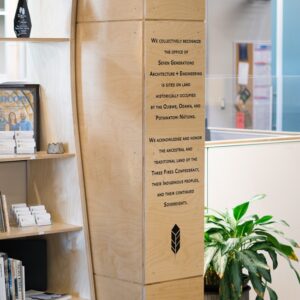Kalamazoo company issues land acknowledgment

By Sam Laskaris
KALAMAZOO, MICHIGAN – A Michigan-based company specializing in architecture and engineering has acknowledged its headquarters is located on the ancestral, traditional and contemporary lands of the Anishinabek.
And the company, Seven Generations A + E, is hoping others not only in its city but also across the United States follow suit.
Seven Generations A + E is a business that works in architecture, engineering, interior design, planning and construction.
And it is one of the companies owned by Mno-Bmadsen, the non-gaming investment arm for the Pokagon Band of Potawatomi Indians.
The company released its land acknowledgment on Sept. 21, which is Sovereignty Day for the Pokagon Band of Potawatomi Indians.
This year marked the 27th annual Sovereignty Day for the band. It has been celebrating its anniversary since 1994, when then-president Bill Clinton signed legislation, marking federal recognition of the tribe as a sovereign nation.
Jeremy Berg, the head of professional services for the Mno-Bmadsen family of companies, believes the land acknowledgment was an important gesture for his company to make.
“At Seven Gen, we feel land acknowledgments as a whole are an important way to commemorate Indigenous peoples’ connection to the land,” he said. “It’s a really big part of what we’re trying to do here.”
The acknowledgment began as follows:
“We collectively recognize the office of Seven Generations Architecture + Engineering is sited on land historically occupied by the Ojibwe, Odawa, and Potawatomi Nations. We acknowledge and honor the ancestral, traditional, and contemporary land of the Three Fires Confederacy, their Indigenous peoples, and their continued Sovereignty.
Our office at 600 E. Michigan Avenue in Kalamazoo, MI, occupies the ancestral, traditional, and contemporary Lands of the Anishinaabek. More specifically, it sits on the traditional land of the Match-e-be-nash-she-wish and his people. By offering this land acknowledgement, we wish to affirm Indigenous Sovereignty and declare that we will work to hold all those employed by and involved with the firm accountable to the needs of American Indian and Indigenous peoples.”
Berg said many of those at his company are non-Indigenous.
“Even though we are tribally-owned, many of our employees and guests are non-[Indigenous],” he said. “So, we felt by publishing a land acknowledgment, it reminds all of us about the ongoing connection that Indigenous people have to the ground on which we live and work.”
The company was founded in 2012. Its headquarters has been at its current location since December of 2018.
Seven Gen had not issued a land acknowledgment at its previous office.
“We’re seeing renewed interest in this throughout our community here in Kalamazoo, Michigan,” Berg said. “Some of the local institutions have been talking about this and as a tribally-owned company, we felt it was important to contribute our part.”
Western Michigan University, also located in Kalamazoo, issued a land acknowledgment in September of 2019.
“And we’re actually working with the Kalamazoo Community Foundation to help them develop one for themselves,” Berg said.
Seven Gen officials are also hoping other companies not only in Kalamazoo but also across the U.S. make similar land acknowledgments.
Berg is hoping his company’s statement creates awareness and shines a light on the fact Indigenous people have always been, they are here now and they will continue to be here.
“It’s important amplifying that is going on and that will continue to go on to people who maybe don’t quite understand that,” Berg said.
Berg also said he believes his company’s statement will provide additional benefits.
“It can develop a greater thoughtfulness about how we can play a role in fostering greater relationships with [Indigenous] people,” he said. “We think this recognition is just a first step but very critical to those relationships.”


